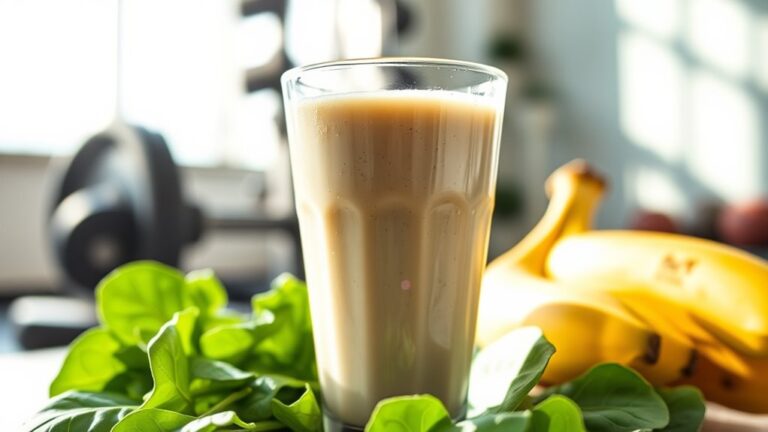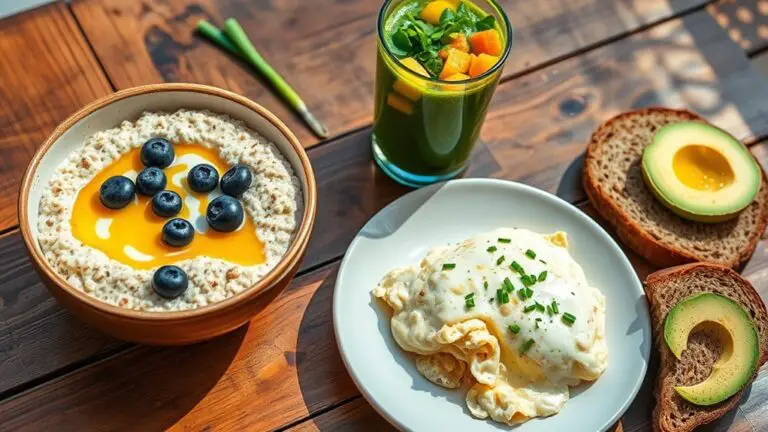What to Eat Before and After a Gym Workout
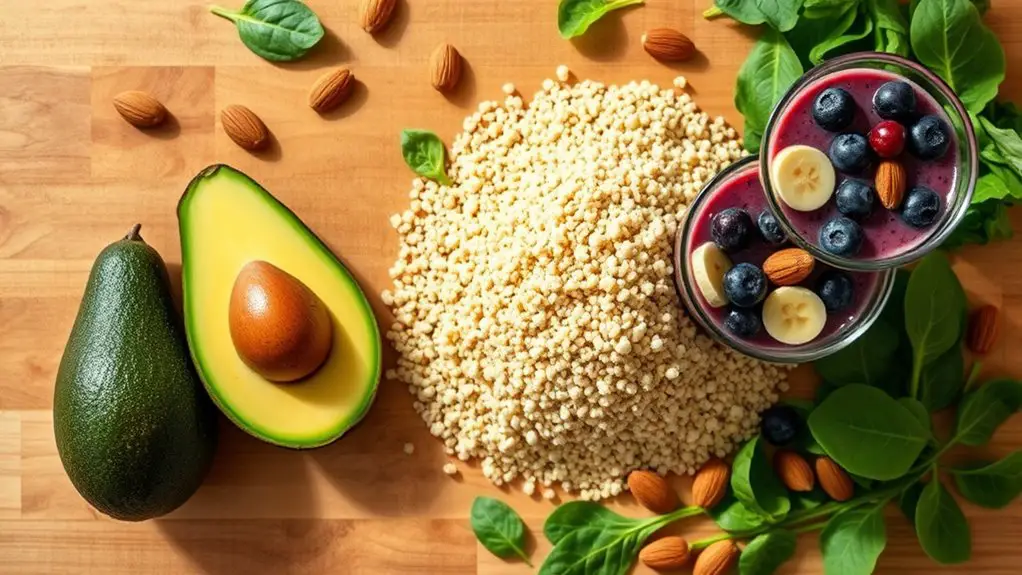
To fuel your workout, aim for a balanced snack 30 to 60 minutes beforehand, like a banana with almond butter or Greek yogurt with berries. This’ll keep your energy up and support your performance. After your workout, focus on recovery with foods like Greek yogurt with fruit or a protein smoothie. These help replenish your energy stores and promote muscle repair. There’s plenty more to discover about optimizing your nutrition for workouts, so keep exploring!
Importance of Pre-Workout Nutrition
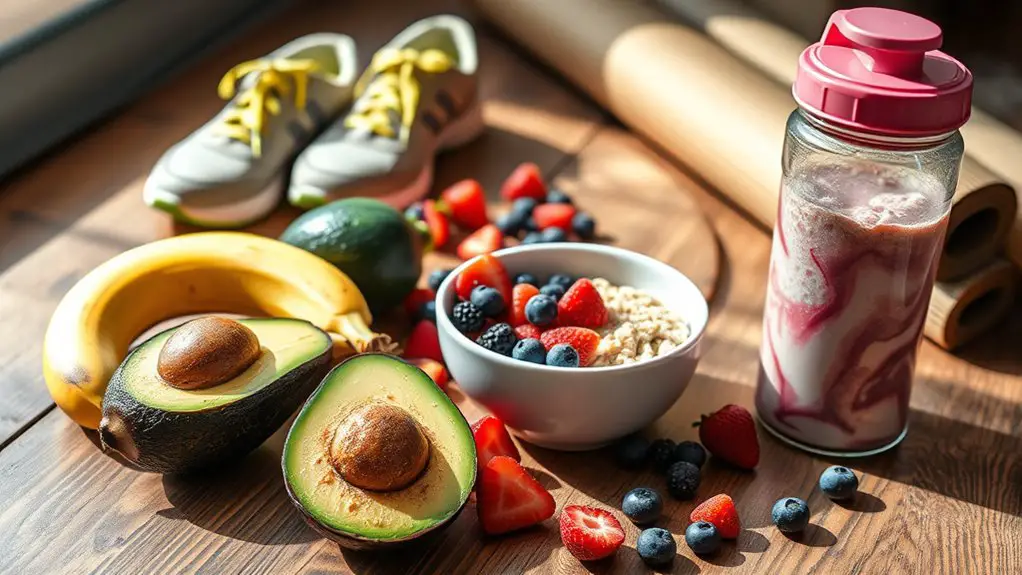
When you fuel your body before hitting the gym, you’re setting yourself up for success. Pre-workout nutrition is essential for maintaining your energy levels and ensuring you perform at your best. One key aspect to reflect on is pre workout hydration. Staying properly hydrated not only helps your muscles function efficiently but also aids in recovery after your workout. Dehydration can lead to fatigue and decreased performance, which is the last thing you want when pushing your limits.
In addition to hydration, think about the timing of your meals. Eating a balanced snack or meal about 30 to 60 minutes before exercising can provide the necessary nutrients your body craves. This will help sustain your energy levels throughout your workout, making it easier to stay focused and safe. Prioritizing pre-workout nutrition can make a significant difference in how you feel and perform during your training sessions.
Best Pre-Workout Foods
Choosing the right foods before a workout can greatly enhance your performance. To fuel your body effectively, consider energy boosting snacks that provide a balance of carbohydrates and protein. For instance, a banana with almond butter offers quick energy and healthy fats, while Greek yogurt with berries can deliver essential nutrients and sustained energy.
Ideal meal combinations include oatmeal topped with sliced fruit or a whole-grain toast with avocado and a hard-boiled egg. These options not only keep you energized but also support muscle function and recovery.
It’s important to choose foods that won’t upset your stomach during exercise, so stick to familiar items. Avoid heavy, greasy meals right before your workout. By focusing on light, nutritious options, you’ll set yourself up for a more productive session at the gym. Remember, the right pre-workout foods can make all the difference in your performance and overall safety.
Timing Your Pre-Workout Meal
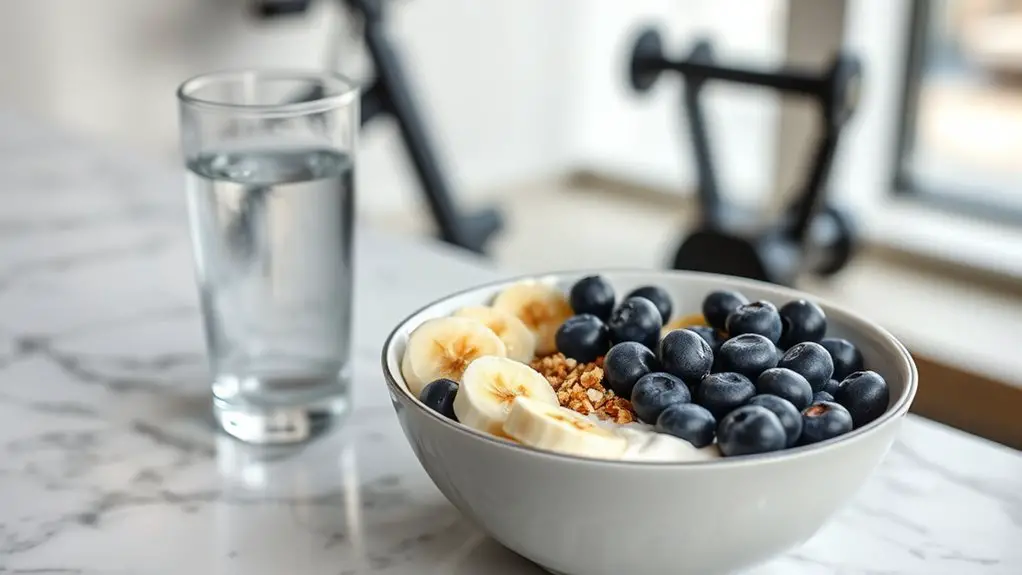
To optimize your workout, it’s essential to time your pre-workout meal properly. The right meal timing can greatly enhance your nutrient absorption, fueling your body for peak performance. Aim to eat about 30 to 60 minutes before exercising to allow your body to digest and start utilizing the nutrients effectively.
Timing your pre-workout meal is crucial for optimal nutrient absorption and peak performance. Aim to eat 30 to 60 minutes before exercising.
Here are some tips to help you time your meal:
- Choose easily digestible foods: Opt for carbohydrates and low-fat proteins to minimize any discomfort during your workout.
- Listen to your body: Everyone’s digestion is different, so adjust your meal timing based on how you feel.
- Stay hydrated: Don’t forget to drink water before you hit the gym to support overall performance.
Benefits of Post-Workout Nutrition
Post-workout nutrition is vital for recovery and muscle growth, as it helps replenish glycogen stores and repair damaged tissues. After your workout, your body craves nutrients to support recovery enhancement. Consuming a balanced meal or snack that includes protein and carbohydrates can considerably improve your muscle repair process. This combination not only aids in rebuilding muscle fibers but also helps reduce soreness and fatigue, allowing you to get back to your routine sooner.
Moreover, proper post-workout nutrition can stabilize your blood sugar levels, preventing energy crashes later on. It’s important to listen to your body and refuel within a reasonable time frame after exercising, ideally within 30 to 60 minutes. This habit guarantees you’re maximizing the benefits of your workout, keeping you safe and feeling your best. Prioritizing post-workout nutrition sets the foundation for long-term fitness success and overall well-being.
Top Post-Workout Foods
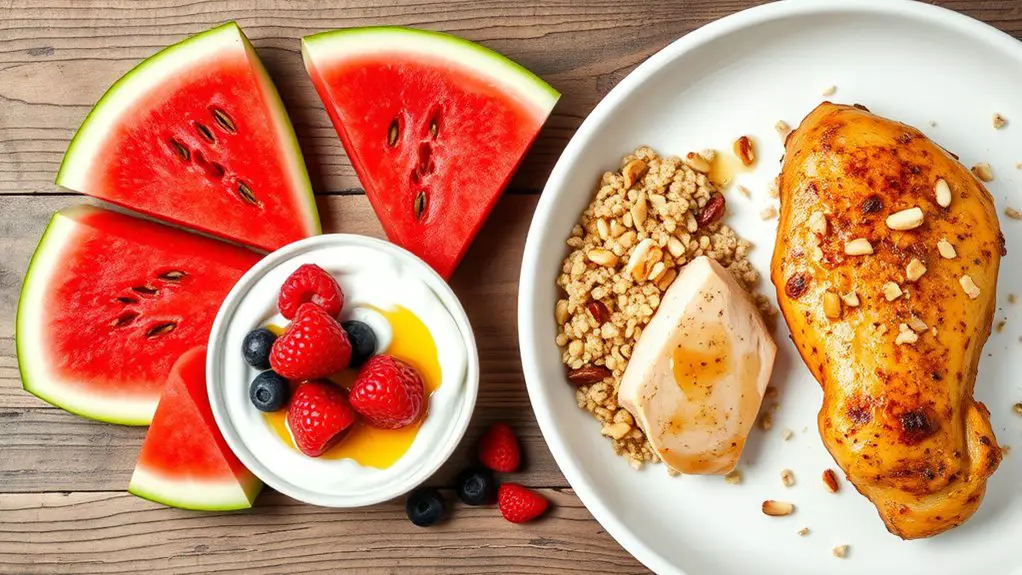
After a demanding workout, your body needs the right fuel to recover effectively. Choosing the right post-workout foods can help replenish your energy stores and repair muscle tissue. Focus on quality protein sources and balanced recovery snacks to optimize your recovery.
Here are some top post-workout food options:
- Greek yogurt with fruit: Packed with protein and carbs, it helps kickstart muscle recovery.
- Quinoa salad with veggies: A complete protein source that’s also rich in fiber and nutrients.
- Protein smoothie: Blend your favorite protein powder with fruits and a handful of spinach for a nutritious drink.
These options not only support recovery but also guarantee you’re getting essential nutrients. Remember to hydrate as well, as replenishing fluids is just as vital for effective recovery. By fueling up with these foods, you’ll enhance your performance and stay safe on your fitness journey.
Frequently Asked Questions
Can I Skip a Pre-Workout Meal?
You might be wondering if it’s okay to skip a pre-workout meal. While it’s possible, it’s generally not recommended. Pre-workout options help fuel your body, enhancing performance and preventing fatigue. Meal timing plays an essential role; eating something light an hour before can make a big difference. If you’re training intensely, consider having a small snack to maintain energy levels and guarantee safety during your workout. Your body will thank you!
How Do I Know if I Need a Snack?
Did you know that nearly 80% of people struggle to recognize their hunger cues? To know if you need a snack, pay attention to your energy levels. If you’re feeling fatigued or distracted, it might be time to eat something. Listen to your body; hunger cues can vary from person to person. It’s important to fuel yourself safely, so opt for a balanced snack that’ll keep your energy steady without overindulging.
Is Hydration Part of Workout Nutrition?
Absolutely, hydration’s a significant part of workout nutrition. Staying properly hydrated can enhance your performance and recovery. You should focus on hydration timing, drinking water throughout the day, especially before, during, and after exercise. This helps prevent dehydration, which can lead to fatigue and decreased performance. Remember, it’s not just about quenching your thirst; maintaining hydration is essential for your overall safety and well-being during any physical activity.
What if I Have Food Allergies?
They say, “An ounce of prevention is worth a pound of cure.” If you have food allergies, it’s essential to choose allergy-friendly snacks and safe meal options. Always read labels carefully and consider preparing meals at home to avoid cross-contamination. Keep a list of your allergens handy when shopping. Don’t hesitate to explore alternative ingredients; there are plenty of delicious options that can keep you safe while satisfying your nutritional needs.
Can Supplements Replace Whole Foods?
You might wonder if supplements can replace whole foods. While supplements offer benefits like convenience and targeted nutrition, they can’t fully replicate the advantages of whole foods. Whole foods provide a variety of essential nutrients, fiber, and antioxidants that support your overall health. Relying solely on supplements may lead to gaps in your diet. It’s always best to prioritize a balanced diet, using supplements only to complement your nutritional needs, not replace them.
